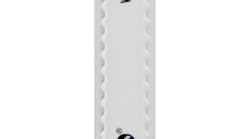James R. Fitzgerald is an accomplished criminal justice professional having worked as both a FBI profiler and forensic linguist. Having retired from the public sector, Fitzgerald now works as a technical advisor for TV shows, such as "Criminal Minds" and "Sleepy Hollow," as well as a part-time consultant and college professor.
Additionally, Fitzgerald, who also had his own show on A&S, "Killer Profile," will be among several experts featured in a six-part documentary series airing later this fall on CBS titled, "Case Closed: The JonBenet Ramsey Case," which will examine the 1996 homicide and what actually happened to the six-year-old the evening of her murder. And next summer, the Discovery Channel will begin airing an eight-part scripted mini-series titled, "Manifesto," which is based on the true story of the Unabomber investigation and the role Fitzgerald played in solving the case through language evidence.
Before he became involved in any of his current professional activities, Fitzgerald launched his career by working in retail security. After graduating from college, Fitzgerald was hired as a store detective for Strawbridge and Clothier in his home town of Philadelphia. He has captured that experience, as well as others, in his autobiography "A Journey to the Center of the Mind, Book I." Next spring, the follow-ups to Fitzgerald’s first memoir, "A Journey to the Center of the Mind, Book II, the Police Officer Years" and "A Journey to the Center of the Mind, Book III, the FBI Years," will be published.
We recently sat down with Fitzgerald to find out more about his loss prevention experience and the role it played in grooming him for his career in law enforcement.
Q: Jim, what made you decide to write a book?
Fitzgerald: A few years ago, I met with a literary agent for lunch. He listened to a verbal summary of my life story and he told me right then and there that I had three publishable books in me. He added that I should get started right away as he was sure they’d make for interesting reads. I took his advice. He would have preferred the first book to be about my FBI career, but I told him I could only write my extended memoir in the chronological order in which it occurred. So, JCM I is about my childhood years through my graduation from the Pennsylvania State Police Academy, on the way to my 31-year career in law enforcement.
Q: Tell us about your early life.
Fitzgerald: JCM I covers my coming-of-age years in the City of Brotherly Love from the early 60s through the mid-70s. It includes numerous anecdotes and childhood adventures, some positive and some, well, not so positive. I made some good decisions along the way, but in my late-teen years there were some which were not so good. I knew some influential and inspiring people during those years and some who were, quite frankly, problematic…whether then or later. when they turned into murderous adults. But, I survived it all, and by the time I graduated college, I finally had my act together. I was then ready to join the workforce, hopefully landing somewhere in the criminal justice system.
Q: You graduated from Penn State University with a degree in Criminal Justice, and it turns out your first job was in retail security as a store detective. Tell us about it.
Fitzgerald: As a 22-year-old with a BS degree, I really wanted to get my foot in the door of anything involving law enforcement or security. I considered a few different options back then but wound up taking a position at the Strawbridge and Clothier Department Store in downtown Philadelphia as a store detective. It was the corporate headquarters and flagship store of what was then a high-scale and very successful retail chain in Pennsylvania and New Jersey. My workplace at this time was within a large twelve-story building with nine floors open to the public. It was a very busy store, to say the least. It even had its own subway exit in the basement. It was especially busy during the Christmas season I worked there as well as during the Bicentennial summer of 1976.
Q: Having read the book, I see where you devote the better part of seven chapters to your year-plus career as a store detective. It seems to have played a pivotal role in your early life and your early career.
Fitzgerald: It absolutely did. I learned so much during my time as a store detective. Several of my bosses were retired Philadelphia police officers and I picked up lots from them. Other members of our approximately fifteen-person department, comprised of both men and women, were long-term store detectives with plenty of retail experience of their own. In my fourteen months there, I acquired the skill sets to deal with all sorts of crimes, criminals, and the related bizarre incidents and bizarre characters that made their way through this expansive, multi-leveled urban retail establishment.
Q: What was your training like back then?
Fitzgerald: Unfortunately, it was minimal. As I discuss in the book, my “formal” training was anything but that. On my first day, I was merely teamed up with another store detective and we would walk around the store in an attempt to observe any crimes in the making, specifically shoplifting, of course. I learned early on that the leather department, men’s and women’s clothing department, and the jewelry department were the hot spots. Other areas like the music department would be popular with the younger thieves. However, no real training was offered regarding the law, arrest procedures, testifying, self-defense, or the like. Not a good thing, I should add. I know it’s changed now...fortunately.
Q: You had a name for shoplifters back then. What was it?
Fitzgerald: Yes, it was "beats." As in, "Jim, go to fifth floor records, there are two known beats ready to hit." I’m not sure who originated that term, whether it was a Philadelphia area regionalism, jargon just in our industry or what, but that was the generic term we applied to shoplifters.
Q: Do you recall your first arrest or your first court testimony?
Fitzgerald: It wasn’t my first actual arrest, but maybe after my fourth or fifth, I had to go to court for a case involving a “beat” who had stolen an expensive three-piece suit from my store. The hearing was in City Hall in downtown Philadelphia. It was quite intimidating too. Even though I was a college grad with a degree in criminal justice, it didn’t prepare me very well for my first-ever courtroom experience. And my training, or lack thereof, at the store’s security department didn’t help me at all either. I spend a full chapter in the book recounting that particular story, the difficulties I experienced that day, but then how it made me a better store detective and law enforcement professional afterwards.
Q: What was technology like back then in regard to retail security and for a store detective in the type of establishment that was Strawbridge and Clothier?
Fitzgerald: Like my training, it was minimal. There were maybe four closed-circuit TV cameras and monitors, but they were focused on loading docks, and I don’t believe they had any recording capabilities. As far as the detectives, we carried individual one-way pagers with us. Normally, it would just beep, we’d go to a nearby in-house phone, call the security office, and find out the problem and where they wanted us to go. If it was something major going down in the store at that very moment, which happened frequently, there was a small speaker on the pager and you’d hear the dispatcher/secretary state something like, "Smash-and-grab on first-floor jewelry, two white males wearing hats, proceed immediately."
About the Author: Liz Martinez is a college instructor and retail security trainer and consultant, with a specialty in ORC. She is the author of the book, "The Retail Manager’s Guide to Crime and Loss Prevention: Protecting Your Business from Theft, Fraud and Violence." She can be reached through her Web site at www.LizMartinez.com.


